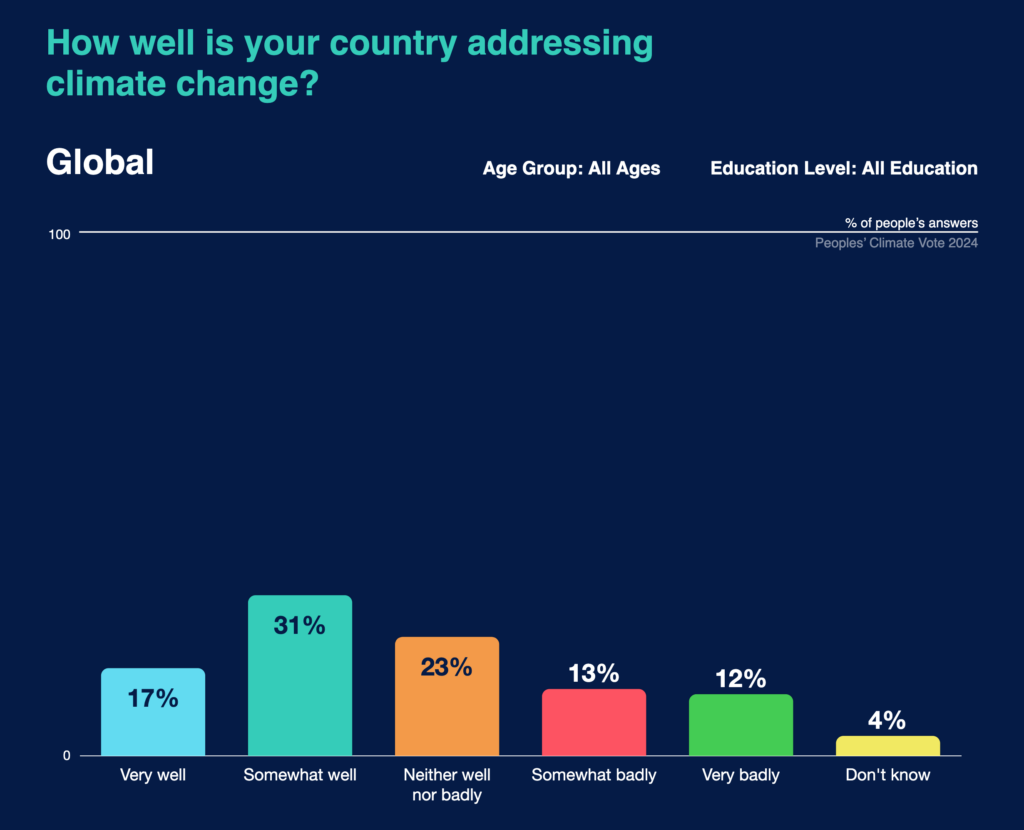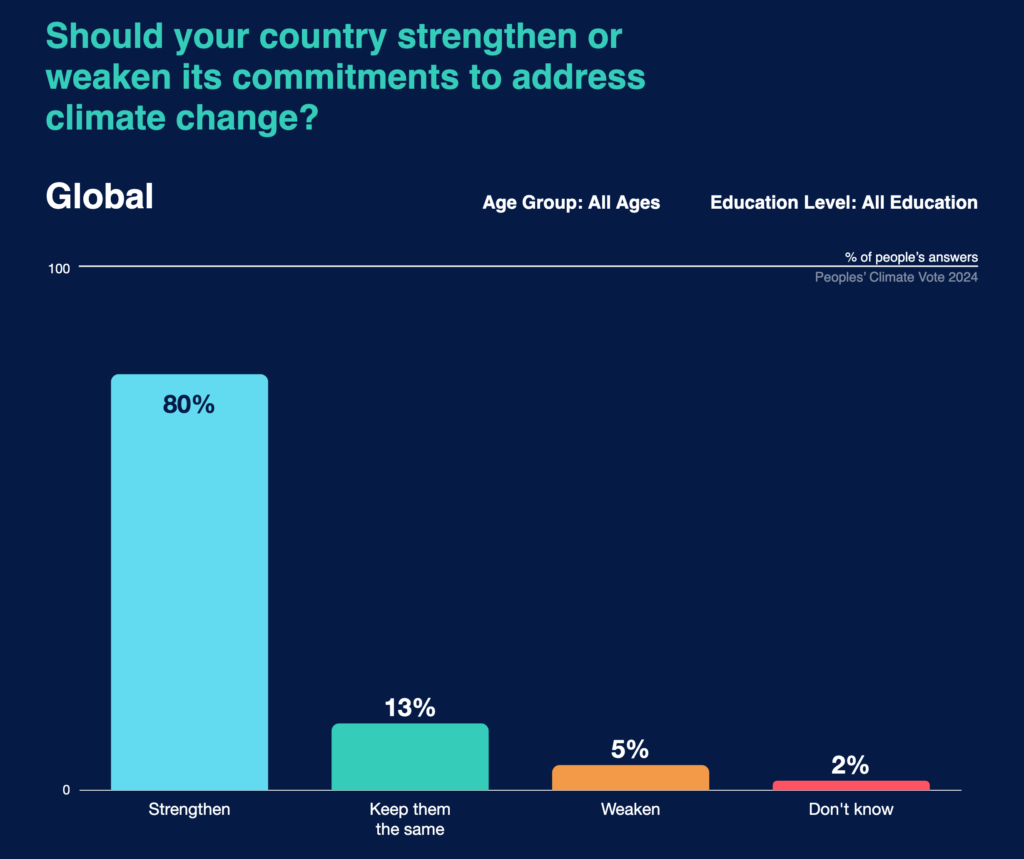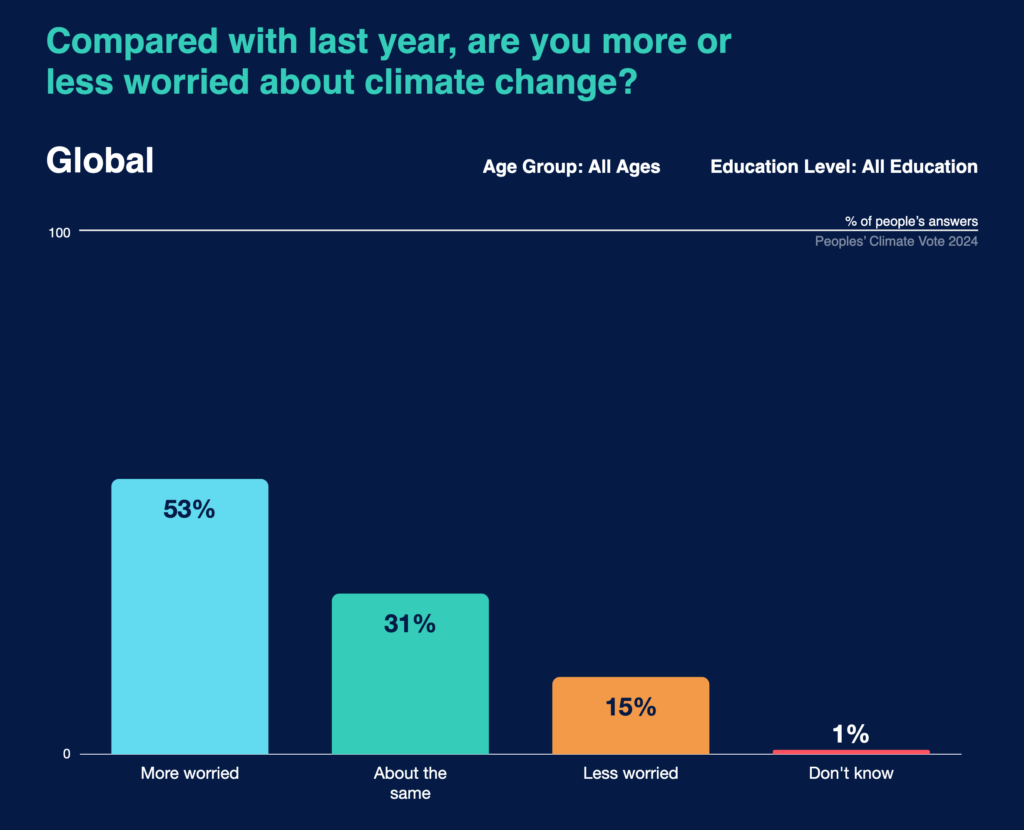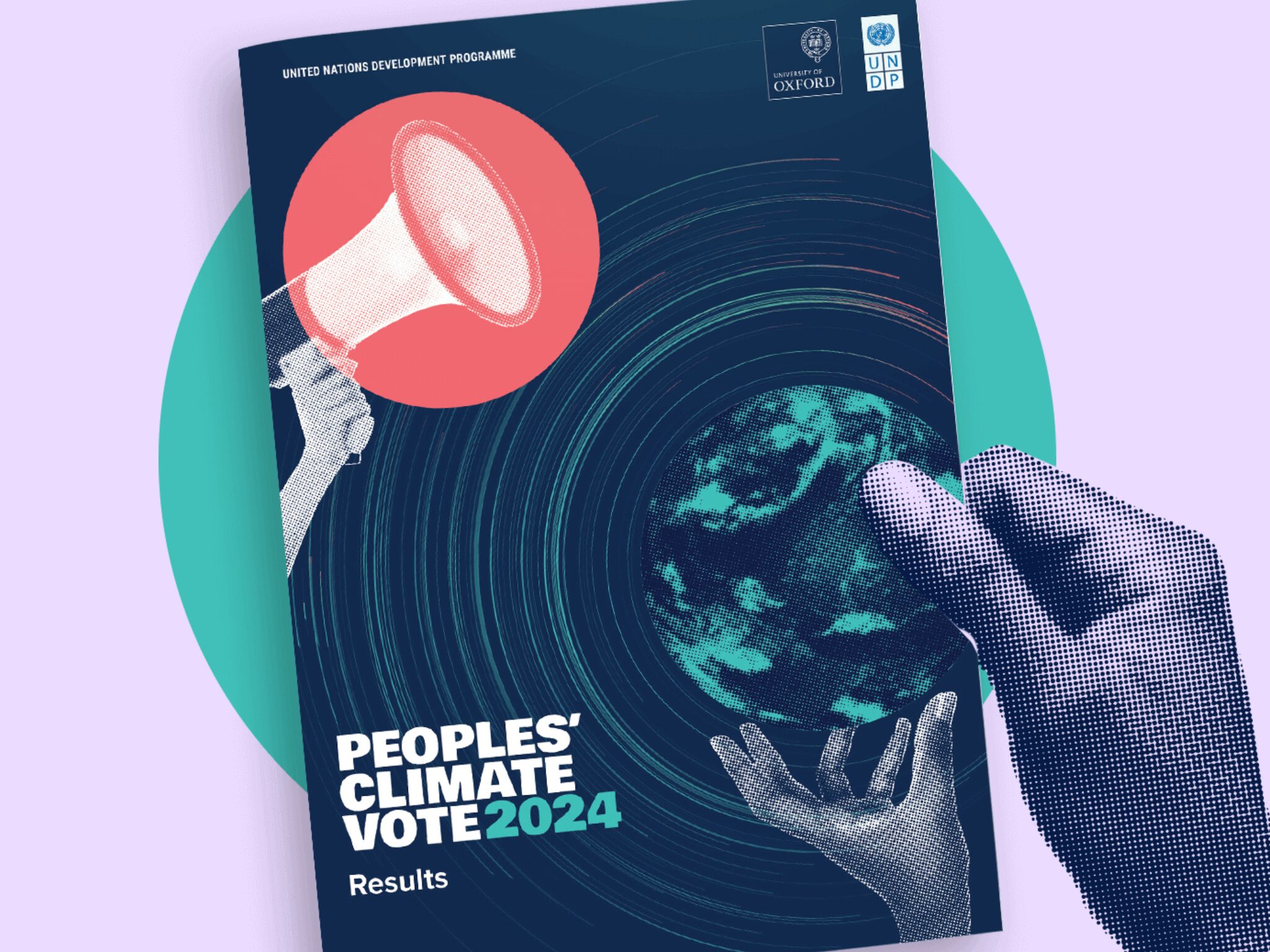72% of People Want Their Countries to Move Away From Fossil Fuels Quickly, Shows UN Survey
7 Mins Read
The majority of the world’s population wants stronger climate action by their governments and a transition away from fossil fuels, the largest-ever climate survey has found.
Most citizens of the world’s biggest polluters want their countries to move away from fossil fuels, the largest source of greenhouse gas emissions, and less than half think their governments are doing enough to fight global heating, according to the largest climate poll ever conducted.
The 2024 Peoples’ Climate Vote report is a result of this public opinion survey, which was carried out by the University of Oxford and GeoPoll for the UN Development Programme (UNDP). Asking 73,765 people from 77 countries what they think about climate action, the poll resulted in some startling findings in contrast with current international action and policies.

Over two in five (43%) respondents believe their government had the most impact in addressing the climate crisis, and this sentiment was shared by respondents in 89% of the countries surveyed. But less than half (49%) said their nations are doing well to tackle climate change, and a quarter think the opposite.
For 13% of the people surveyed – which included those often overlooked by polling, like older women without any formal education – big businesses are the most accountable entity for climate action. But only 39% say these companies are doing well.
“The Peoples’ Climate Vote is loud and clear. Global citizens want their leaders to transcend their differences, to act now and to act boldly to fight the climate crisis,” said UNDP administrator Achim Steiner. “The survey results – unprecedented in their coverage – reveal a level of consensus that is truly astonishing.”
The world wants governments to step up

When asked whether their countries should ramp up their climate commitments, 80% of respondents agree, while only 5% say governments should weaken their goals. People in more vulnerable regions and the least developed countries – like Haiti, sub-Saharan Africa, Afghanistan and Laos – show the greatest level of support for this statement.
The majority of consumers in the 20 most polluting countries agree too, including China (73%), the US (66%), India (77%), Russia (66%) and Indonesia (86%). But disappointingly, the US has the largest share of people who wanted their government to weaken its climate commitments (28%), highlighting the impact of misinformation in the world’s largest economy.
Women are also more in favour of strengthening nationally determined contributions (NDCs) than men in five big emitters (Australia, Canada, France, Germany and the US). And even people who say their country is doing well want stronger commitments.
“We urge leaders and policymakers to take note, especially as countries develop their next round of climate action pledges – or ‘nationally determined contributions’ under the Paris Agreement. This is an issue that almost everyone, everywhere, can agree on,” said Steiner.
People want fossil fuels out – and quickly

Majorities in 85% of the countries want a quick transition towards renewable energy, with 72% of global consumers hoping for their governments to move away from fossil fuels – something highlighted in the Global Stocktake document at COP28, which fell short of a complete phaseout that many called for.
In China and India – the largest coal producers – 80% and 76% want a fast transition to green energy. In the US, the largest oil and gas producer, 54% support this statement, and 75% do the same in Saudi Arabia, the second-biggest oil producer. These majorities exist in most big fossil fuel players, including Iran (79%), Australia (69%), Nigeria (89%), the UK (76%), Brazil (81%) and Canada (65%).
The exceptions were Russia and Iraq, where only 16% and 43% want a quick transition to clean energy. In the former, the second-largest gas producer, over 20% of people don’t want their government to move away from fossil fuels at all, the highest amongst all countries surveyed. Globally, only 7% don’t express support for this shift to low-carbon energy.
“There are very narrow, self-interested agendas that maintain artificially inflated [profits] for fossil-fuel-based industries that ultimately are coming at the cost of everyone,” Steiner told the Guardian. “Hundreds of billions of dollars of fossil fuel subsidies are artificially slowing down an energy transition – [it] is deliberately being held back by a distorted market.”
“But we are definitely peaking on fossil fuels and we are seeing exponential growth rates in renewables and what the public ultimately wants is unquestionably pointing in the direction of a net-zero transition.”
Governments need to protect people from extreme weather

Almost eight in 10 (78%) say they want more protection for people at risk from extreme weather, which has killed two million globally since 1970. This includes investment in resilient infrastructure, protecting and restoring nature, providing early climate warnings, education on dealing with extreme weather, and providing disaster risk relief.
In fact, even more people (79%) want rich nations to give help to less affluent and more vulnerable countries to adapt to and mitigate the effects of climate change. This includes 74% of people in G20 nations, although this group of countries also had the five nations with the biggest gender gap – women were much more supportive of such policies than men in the US, Australia, Brazil, Saudi Arabia, and Germany.
India was the only country where men (79%) were “substantially more likely” than women (73%) to be in favour of wealthy countries providing more aid to poorer ones.
People also want countries to put their differences aside and collaborate with each other to tackle climate change, with 86% saying so. That said, those with lower levels of formal education were less supportive of this.
Speaking of which, 80% of respondents want schools to teach children more about climate change, with the highest support for this statement coming from the least developed countries. On the flip side, the US (29%) has the most people who want lesser climate education in schools, followed by Indonesia (26%) and Papua New Guinea (21%).
Climate change is on people’s minds

Over half (53%) of people are more worried about climate change now than they were a year ago. Surprisingly, older respondents are more concerned – those aged 60 and above (64%) are losing more sleep over the crisis than those aged 18-35 (56%) and under 18 (51%).
Worryingly, a majority of Saudi Arabians (more than 50%) are less worried about the climate crisis, despite nearly 1,000 people dying due to excessive heat in the country during last week’s Hajj pilgrimage.
Globally, nearly a third (32%) of the population thinks about climate change daily, and another quarter (24%) does so weekly. Only 11% never think about it. The daily figure skews higher in Arab states (47%) and Latin America and the Caribbean (44%) than in western and northern Europe (28%) and North America (22%).
In fact, Jordan (27%), Saudi Arabia (26%) and the US (24%) have the highest percentages of people who never think about the climate crisis.
Climate change is also impacting big decisions (like where to live or work, or what to buy) for nearly seven in 10 (69%) people around the world. But majorities in four G20 countries – Russia (74%), the US (59%), Germany (52%), and the UK (52%) – say it doesn’t impact their decision-making.
The Peoples’ Climate Vote is a crucial tool for policymakers in a year where half the world will end up voting, with the climate crisis on the ballot. “As world leaders decide on the next round of pledges under the Paris Agreement by 2025, these results are undeniable evidence that people everywhere support bold climate action,” said Cassie Flynn, global director of climate change at the UNDP.
“The next two years stand as one of the best chances we have as the international community to ensure that warming stays under 1.5°.”



